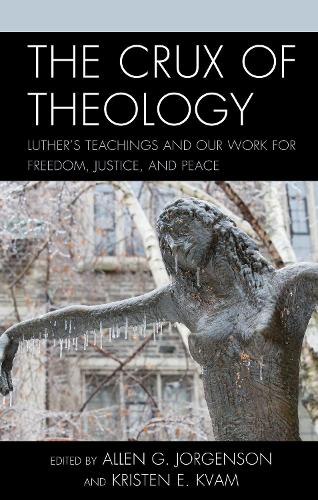
The Crux of Theology: Luther's Teachings and Our Work for Freedom, Justice, and Peace
(Hardback)
Publishing Details
The Crux of Theology: Luther's Teachings and Our Work for Freedom, Justice, and Peace
By (Author) Allen G. Jorgenson
Edited by Kristen E. Kvam
Contributions by Anthony Bateza
Contributions by Christine Helmer
Contributions by Allen G. Jorgenson
Contributions by Kristen E. Kvam
Contributions by Mary Elise Lowe
Contributions by Robert Overy-Brown
Contributions by Mary Philip
Contributions by Caryn D. Riswold
Bloomsbury Publishing PLC
Lexington Books/Fortress Academic
20th May 2022
United States
Classifications
Professional and Scholarly
Non Fiction
Human rights, civil rights
Lutheran Churches
230.41
Physical Properties
Hardback
222
Width 160mm, Height 227mm, Spine 23mm
517g
Description
The title of this book plays upon the central place a theology of the cross holds in Lutheran theologies, especially potent in Luther's Heidelberg Disputation (1518). The 500th anniversary of this document coincided with the 70th anniversary of the Declaration of Human Rights by the United Nations wherein the preamble points to a global aspiration of a common good shaped by freedom, justice and peace. This book is located at the intersection of these two themes, asserting that the cross has material content in being the means by which Christ in suffering solidarity with individuals, communities, and the cosmos advances freedom, justice, and peace. Employing a variety of methods, and exploring a broad range of geographic locales, the contributors illumine the misuse of Reformation themes and offer a corrective in service of a common good that is publicly accountable and theologically sound. The book thereby explores how contemporary Lutheran theology has utility both for analyzing injustice and for advancing justice in local as well as global contexts.
Reviews
A timely and fascinating engagement with the Lutheran tradition to mine resources to address contemporary issues such as human rights, freedom, global racism, and climate justice. The diverse authors display both intellectual rigor and commitment to the common good. This book is a must-read for people interested in the future of Lutheran studies and the intersection between theology and politics.
--Kwok Pui-lan, Candler School of Theology, Emory UniversityHuman rights and the rule of law are essential for modern democracy and citizenship. While Lutheran churches today are committed to the promotion of these cornerstones of our society, the historical and intellectual resources of Reformation theology in these matters continue to be debated. The present volume offers the reader a deepened understanding of justice, freedom, and human rights as they appear in the context of Luther's theology of the cross.
--Risto Saarinen, University of HelsinkiAuthor Bio
Allen G. Jorgenson is assistant dean and holds the William D. Huras Chair in Ecclesiology and Church History at Martin Luther University College at Wilfrid Laurier University in Waterloo, Ontario.
Kristen E. Kvam is professor of theology at Saint Paul School of Theology in Greater Kansas City and Oklahoma City.
